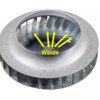Indeed, the Texas heat is quite severe this summer.
...Notably, the faster I drive the hotter the oil becomes, so at some point I may be forced to slow down. However, I'm running 10W-30 Valvoline Classic/Racing oil, which is synthetic and will maintain its lubricity properties at temps way above 300^0 F. So I SHOULD be ok even at elevated oil temps. Perhaps I'm missing a temperature failure that's not oil related?
Jason
Generally, if a VW engine's oil temperature is much above 225-230° F. for any length of time, the stock magnesium engine case's temp can get well beyond it's design parameters which will eventually affect it's structural rigidity. It doesn't happen overnight, but run it often enough at those elevated temperatures and it's a recipe for disaster. It isn't the oil- it's the case's design/structural limitations that we're working with here.
Do enough reading and you'll find that some people's engines only last a fraction of what most people consider 'acceptable' life for the combo- I've seen someone I know's hot 2 liter turned into junk in 9800 miles- the case no longer had oil pressure at idle when at operating temps and the heads were so overheated they couldn't be rebuilt. The middle main bearing web was spread (classic case overheating failure- a replacement case was required) and the guides were falling out of the heads, so they were junk as well. And this happens more often than you think.
Build a well matched, streetable combo with solid parts, make sure the tune (carb sizing/jetting and ignition timing) is right, don't constantly drive the bag off it from the moment it's started to when it's shut off, manage it's OIL AND HEAD temps properly (this quite often means installing a thermostat controlled oil cooler and introducing more air into the engine compartment to carry away heat radiated off of the engine so the carbs and cooling system isn't consuming pre-heated air), change that oil regularly and these things can last a long time.
A couple of easy ways to tell what's going on- if the cylinder covers are so hot you can't hold your hand on them for more than a quick touch, you probably need more airflow into the engine compartment, and if a drop of water (or spit) sizzles on the top of the engine case- it's getting too hot!
VW never built (or even dreamed of) Type 1 engines with the power levels we get out of them today and there's no factory engineering/cooling solutions for the extra heat they produce, so you're the engineer in charge of keeping it alive. Sadly, too many guys, after building their high perf VW engine, start it up, decide 'yup, it runs real good!' and drive off, never considering what it really needs to live a long, happy life.
Hope this helps. Al






